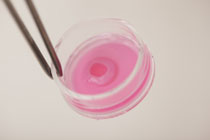Advanced therapy medicinal products (ATMP)
|
Cells and tissues used to treat diseases or to regenerate tissues are probably the by far most interesting and promising development of medicine in the 21th century. The term advanced therapy medicinal product is the official name of this group and summarizes different products such as stem cells, skin, cartilage, bone or tissue-engineered heart valves, blood vessels or organoid structures. |
 |
ATMP definition (REG 1394/2007)
ATMPs and TEPs (also TEMP, tissue-engineered medicinal products) are defined in the so-called ATMP regulation of the European union REG1394/2007. A link to this and other EMA, FDA, ICH and DIN documents can be found on out ATMP literature page.
(a) ‘Advanced therapy medicinal product’
means any of the following medicinal products for human use:
- a gene therapy medicinal product as defined in Part IV of Annex I to Directive 2001/83/EC,
- a somatic cell therapy medicinal product as defined in Part IV of Annex I to Directive 2001/83/EC,
- a tissue engineered product as defined in point (b).
(b) ‘Tissue engineered product’ means a product that:
- contains or consists of engineered cells or tissues, and
- is presented as having properties for, or is used in or administered to human beings with a view to regenerating, repairing or replacing a human tissue.
A tissue engineered product may contain cells or tissues of human or animal origin, or both. The cells or tissues may be viable or non-viable. It may also contain additional substances, such as cellular products, bio-molecules, bio-materials, chemical substances, scaffolds or matrices.
Products containing or consisting exclusively of non-viable human or animal cells and/or tissues, which do not contain any viable cells or tissues and which do not act principally by pharmacological, immunological or metabolic action, shall be excluded from this definition.
(c) Cells or tissues shall be considered ‘engineered’ if they fulfill at least one of the following conditions:
- the cells or tissues have been subject to substantial manipulation, so that biological characteristics, physiological functions or structural properties relevant for the intended regeneration, repair or replacement are achieved. The manipulations listed in Annex I, in particular, shall not be considered as substantial manipulations,
- the cells or tissues are not intended to be used for the same essential function or functions in the recipient as in the donor.
ATMP regulation by authorities (REG 1394/2007)
Since 2012, all ATMPs produced in Europe have to be registered with the European medicines agency (EMA) and a marketing authorization is required. Only in few cases a so-called hospital exemption is granted by national authorities. In the US the marketing authorization is granted by the FDA (Food and drug administration).
This means that ATMPs have to be produced in accordance with the good manufacturing practise regulations (GMP), guidelines and laws. Due to the special nature of these biological products the laws and regulations are under review with respect to several crucial aspects e.g., such as sterility testing, uniformity and functionality.
Tissue-engineered cultures as test systems
Besides their use as medicines, tissue-engineered models and cultures are now developed to replace animal testing for chemicals and cosmetics. These tissue products also have to be validated but are regulated not under GMP but by chemical laws, REACH and OECD guidelines.
Examples of tissue-engineered test systems
The by far most well developed test system is the skin model. It is already used by the cosmetics industry and several validated systems are on the market. The German Fraunhofer Institut currently validates an epidermal model. A combined primary cell and cell line model is the skin cancer model currently developed at the Freie Universität Berlin.


